
The law surrounding sex workers in the UK and beyond
The legal climate associated with sex work varies worldwide, with some nations opting for criminalised models, others operating under decriminalised systems, and others somewhere in-between.
England and Wales
In England and Wales, it is legal to sell sex between two consenting adults. However, certain elements have been criminalised:
- Soliciting, which means approaching someone and offering services as a sex worker
- Kerb crawling, which is the act of driving slowly along the edge of a road in search of a sex worker
- Brothels, which is a house or premises where people pay to have sex with sex workers
- Causing, inciting or controlling prostitution for gain, most closely related to the term ‘pimp’ - which is an individual who organises and controls the activities of sex workers, often taking a portion of the earnings
- Advertising if it is: graphic, carding in telephone boxes, or on the internet
- Trafficking for sexual exploitation
- Paying for sex with someone who has been coerced
- Paying for sex with a minor
This system is known as prohibition, or quasi-criminalisation - where sex work is not necessarily illegal as such, but the general intention is to discourage the practice using legal implications.
The legal climate of sex work in England and Wales creates a paradoxical situation, where buying and selling sex is legal between two consenting adults, but it is very difficult to do so without committing an offence.
Criminalisation around the globe
In many countries around the world, sex work is fully criminalised, meaning the sex worker, client, and any third parties - such as managers, landlords and drivers, are all criminalised. This model has been adopted in China, Pakistan and Russia, amongst others.
The Nordic Model sees an alternative approach - where those who purchase sex are the ones criminalised, as opposed to the sex worker, who is ostensibly decriminalised. This model has been adopted in Sweden, Norway, Iceland, France and Northern Ireland.
In this case, the sex worker is labelled as a ‘victim’, and the client is the ‘offender’. This legal model was informed by a radical feminist perspective on sex work, which views prostitution as violence against women.
Legalisation is a model found most commonly in the Netherlands and Germany, where sex work is legal, so long as it meets certain state-specific conditions, for example, the licensing of brothels or particular spaces. A ‘Red Light District’ is a certain space or area formally, or informally designated for sex work - with a famous instance of this being in Amsterdam.
In very few places internationally, sex work is entirely decriminalised - meaning all laws criminalising consensual sex work are removed. The sex worker, the client and third parties are decriminalised, and the sex industry is regulated by labour laws, as opposed to criminal laws.
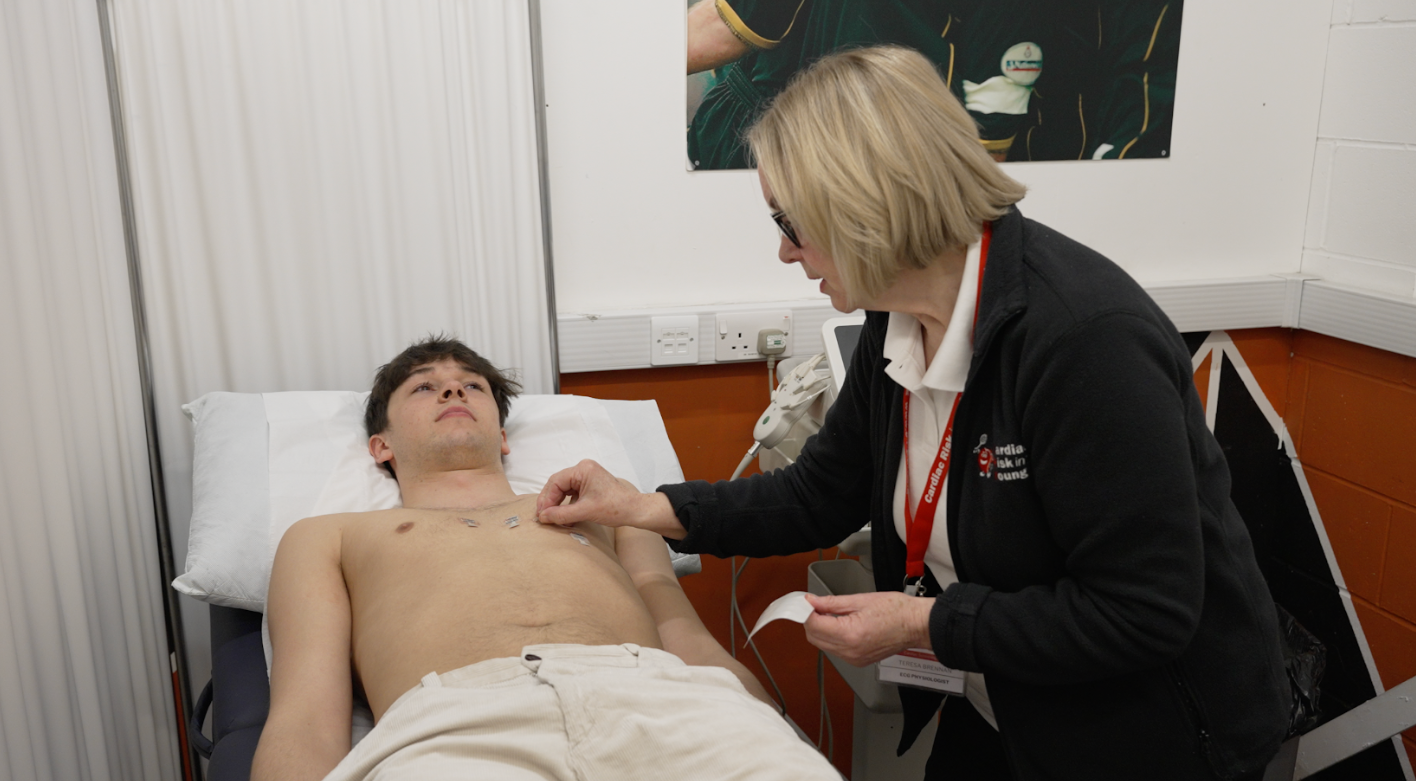
The debate over ECGs: Should the UK introduce mandatory heart screenings for young athletes?
A national charity executive has declared his "absolute frustration" because a government advisory body refuses to support compulsory screening for a leading cause of death in young sports players.
Sudden Cardiac Death is the prime cause of fatalities among athletes in the UK, with one in 50,000 young athletes dying of SCD each year.
Despite the emotional weight of sudden deaths in young athletes, doctors and policymakers disagree on whether mandatory heart screenings should be adopted for them in the UK.
Dr Steven Cox, CEO of Cardiac Risk in the Young, said his charity has been campaigning against the National Screening Committee, which is responsible for advising the government and whose stance is that electrocardiogram screenings should not be universally enforced for elite youngsters.
He said: “There have been many challenges when the NSC has done their consultation process, in essence, they don’t believe the ECG is a powerful tool, and say that screening does more harm than good because of false positives.”
He said that while around four per-cent of the 30,000 14-35 year olds screened by CRY each year are referred for further tests, most are given the all-clear. However, he emphasised that these follow-ups are necessary to monitor ECG abnormalities and should not be dismissed as false positives.
A spokesperson for the The National Screening Committee said: “Screening policy must always be based on scientific evidence, which suggests that current tests are not accurate enough to use on young people without symptoms.
“The current focus is to rapidly identify and care for high-risk individuals, however, we will keep this under review based on advice from independent experts.”
In Italy, athletes must undergo annual pre-participation evaluations, including ECG screenings to identify cardiovascular diseases that pose a risk of sudden death during sport.
Since the introduction of this screening model in 1982, Italy has seen a fall in the incidence of sudden cardiac death in sport by 89%, according to JAMA.
Dr William Parker, a NIHR clinical lecturer in cardiology, said athletes are disproportionately affected by sudden cardiac death because repeated extreme exercise can exacerbate conditions that lead to cardiac arrest.
He said: “The high stress setting of a football match or a marathon can lead to heart problems that cause cardiac arrest.
“Repeated exercise leads to thickening of the heart muscle, which, in itself is not a harmful phenomenon, but if you've got a condition that leads to thickening of the heart in the first place, then exercise can worsen it.”
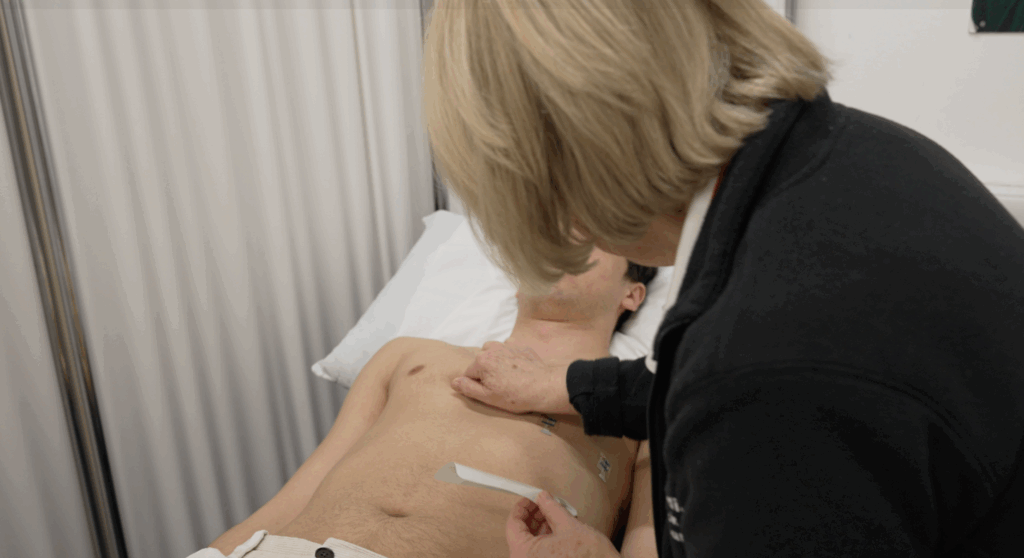
Dr Parker says the debate over whether to introduce mandatory ECGs for young athletes in the UK centres not on the benefits of screening, but on the limitations and potential drawbacks of current testing methods.
He said: “The question is, what test do you use? We could detect a number of things using clinically available tests, including heart tracings and ECGs which are good at detecting some features of conditions that can lead to cardiac arrest in young people, but they're not particularly specific all the time.
“You also often get a lot of people who have some abnormalities on those tests, who will not turn out to have a condition.”
Cardiologist Dr Tim Chico, of the University of Sheffield, said ECGs can often pick up false positives and minor abnormalities that do not need monitoring, but still takes up vital NHS time.
He said: “After people have an ECG that picks up a minor abnormality, they are referred to their GP and later referred to me.
“This process takes months and people spend this time terrified, avoiding things that are good for their health, like sports, when in the end it turns out you aren’t at high risk of sudden cardiac death.”

Online sex worker fights back against criticism
An online disabled sex worker who sells content on Facebook is fighting back against criticism of the industry stating what is exploitative for one person is empowering for another.
Kirby, 29, believes no one has the right to criticise the trade if they haven't been a sex worker themselves.
They said: "People love to assume that every conversation needs to involve them, but it really doesn't. You don't get an opinion on something you have no experience with or education on.
"Every sex worker is a different, individual human being. What is empowering from me, if exploitative for another."
Kirby, from Hull, initially sold content on Only Fans, and says they love being a sex worker. They believes people hold preconceived notions about sex workers but these beliefs tend to stem from deeply ingrained misogyny and rape culture.
"Many people believe that sex workers have no respect for themselves, that to sell their time means they are selling their bodies and that is disgusting," they said.
Kirby was keen to point out whether they are doing full service sex work or online, does it for different reasons.
They said: "I am disabled. I do it partly for the money and partly because I enjoy it. I get to dress up and feel sexy. I just want to get by and have fun, while I can, before my health gets worse. "
Kirby has found that sex work has been beneficial for their self confidence, body positivity and even their relationship.
They believe a common misconception is that digital sex work is easy and it is simply being paid to take a couple of naked photos.
But Kirby said: "You need something that sets you apart from the millions of other sex workers. It truly is an incredibly over-saturated market and you need to stand out to be different from the next person and to keep people coming back.”
Online sex workers must also take steps to protect themselves. Kirby explained despite being behind a screen, many sex workers face hate, abuse, and threats, while also dealing with the risks of having their content stolen, reposted, and attracting stalkers.
"I get a lot of nasty comments from men either telling me I am a slut for doing sex work or asking for free content," Kirby said.
In the past Kirby has received a message on Only Fans from a subscriber alluding to them knowing they were. It was only after exchanging messages Kirby realised that he was a barman from a local pub who they knew.
He asked for custom videos which Kirby filmed straight away but the barman never replied after being asked for payment.
"That was my worst experience because it made me feel so vulnerable," said Kirby. "I believe he was just mocking me."
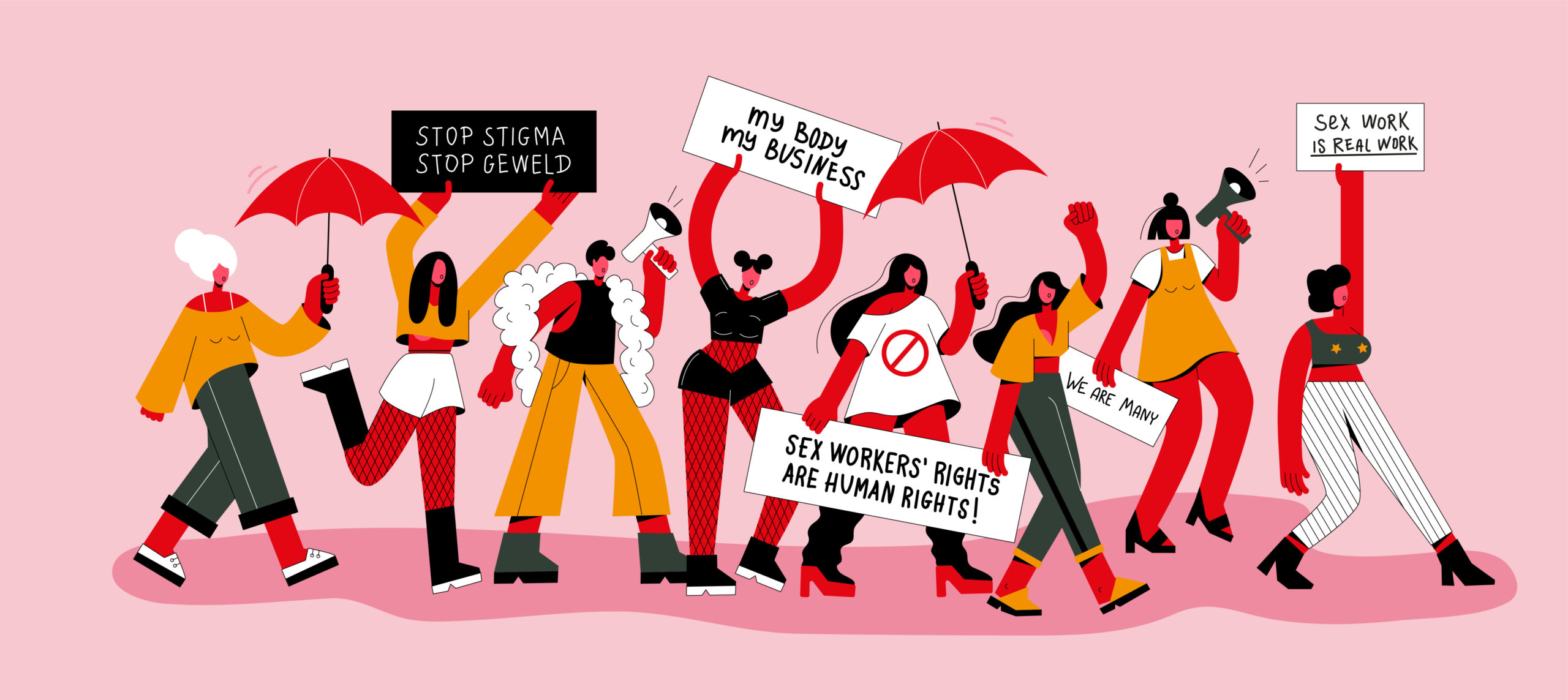
Sex work and feminism: empowerment, exploitation or economic survival?
Whether sex work should be considered empowering or exploitative remains one of the most disputed debates within feminism.
At the heart of this divide are two polarising positions - radical feminists, who view sex work as inherently exploitative, and sex-positive feminists, who understand sex work to be an expression of women’s sexual autonomy.
At the centre of this debate is those who believe sex work is work and, when women face limited financial options, they should have the right to work in the sex industry without facing persecution and stigma.
The International Committee on the Rights of Sex Workers in Europe published a briefing paper to explain the intersection between feminist ideologies and sex workers' rights.
The ICRSE explains that radical feminists, also known as abolitionists or neo-abolitionists, believe that sex work is a form of violence, similar to slavery, regardless of whether it is forced or voluntary.
For this reason, it seeks the end of prostitution through regulations and prohibitions, including the criminalisation of the clients.
In radical feminist ideology, the sex worker is seen as an object who cannot speak for themselves, so the radical feminist speaks for them.
The Network for Sex Work Projects references this on their website, saying: "Not only do sex workers not see our work as akin to slavery but using this term this term minimises and trivialises the experiences of those who have (and do) endure slavery."
Contrary to the core discourse of radical feminists, sex-positive feminists hold the view that sex work is empowering and an individual choice.
These two perspectives of domination and liberation are often considered too simplistic, when the reality for many is far more complex - which is where a third perspective comes in.
The 'sex work as work' viewpoint recognises choice may be constrained, but sex workers should be able to speak for themselves and that the key issues relate to bad laws and social stigma.
It argues that sex work is a legitimate form of work, but there is an inherent problem with being forced to work for survival and capitalist societal structures should be critiqued instead.
An important aspect of this is that sex work is defined as the consensual exchange of money or other goods for sexual services, however it is understood that not everyone is in an equal position during transactional sex.

Thieves and vandals put lives at risk by targeting defibrillators
Staggering figures have revealed 124 defibrillators have been vandalised or stolen across England over the last two years.
Data collected from a Sheffield Wire Freedom of Information request sent to all 39 police forces, has shown how even life-saving equipment is not safe from criminals.
Steve Cox, the CEO of charity Cardiac Risk in the Young (CRY), stressed the life-saving benefits of defibrillators were also undermined by issues such as coded boxes and locations inside buildings - restricting the simplicity of their access.
He said: “Defibrillators are essential and we need to protect them, however, there are many situations where they are impractical, for example, with cyclists. It is not just about access to defibrillators but the need for mandatory screenings.”
The average cost of defibrillators varies between £700 and £1,300 and while individual parts are not equally valuable, electrode pads and batteries have a more significant cost ranging between £20 and £300.
DefibSupplies, an NHS approved supplier, said thieves were stealing the devices to sell on the black market or even overseas, where they can command a high price.
Defibrillators can be kept in locked or unlocked cabinets but insurance is rarely offered to those stored insecurely.
This proves as a barrier to immediately accessing the equipment to save someone’s life, yet protects the equipment from threat of theft or vandalism.
As well as theft, a lack of awareness surrounding cardiac arrest and the use of defibrillators, is leading to acts of vandalism.
Helen Barry, managing director of Defibstore, highlighted the significance of educating the public on what the equipment actually is and the significance of mandatory screenings to spread this awareness.
She said: “If people are educated and there is more awareness around the importance of the equipment and what it does, I believe it would reduce vandalism and thefts.”

Mr Cox added changes needed to be made to protect these essential appliances as when someone goes into Sudden Cardiac Arrest (SCA), the chance of success decreases by 10 per cent every minute that passes.
He said: “We need cameras on stored defibrillators as there needs to be free access. You cannot afford to lose a minute.”
Areas such as Devon and Cornwall, Greater Manchester and Leicestershire are amongst the regions that have shown the highest levels of defibrillator theft and vandalism in England.
A Leicestershire Police spokesperson said: “The theft of essential life saving equipment has a damaging and negative effect on those who may need it as well as the local communities and charities.”

What are prostitute’s cautions and how do they trap UK women into poverty?
Prostitute's cautions are trapping thousands of women in the UK into a cycle of poverty forcing them to accept lower paid work or to live on benefits.
One woman told the English Collective of Prostitutes (ECP) in a 2024 report "It’s stopped me from applying for any job".
She said: "I ended up living on benefits with my children. It caused me all kinds of problems and I had no money.”
Laura Watson, a spokesperson for the ECP told BBC Woman's Hour: “We really want to let people know that these are mothers working to feed themselves and their children and they are punished for life just for trying to make a better life for yourself or your child where you have very little other options.”

EnglishCollectiveofProstitutes (@ecp_org) • Instagram reel
A prostitutes caution is a specific type of caution reserved for the punishment of sex workers. It is a UK police warning for suspected prostitution-related offenses, including loitering or soliciting. Unlike other cautions, a ‘prostitute’s caution’, does not require a person to admit an offence or agree to it.
According to the ECP thousands of women in the UK have received a prostitutes caution. Last year, the organisation released their ‘Proceed with Caution’ report.
The research was conducted by sex workers, who interviewed their colleagues and friends on the impact of ‘prostitute’s cautions’ and convictions on their lives.
Nadia Whittombe, MP for Nottingham East, told BBC Woman’s Hour: “The current situation is that the state pushes people into poverty. We know poverty is the main driver behind sex work, then the state criminalises sex work further trapping them. We need full decriminalisation of sex work because we know that is what is proven to keep women safe.”
Following the report, the ECP emphasised the need for a full decriminalisation of sex work arguing prostitutes cautions are “a deliberate policy against women designed to keep women in poverty by penalising those of us who use sex work to escape from it”.
Police in the UK do not publicly track the number of cautions issued to individuals involved in prostitution. While there's no official data on the number of cautions, it's known that these cautions can have significant long-term consequences for those involved.
Another woman, told the ECP, she was kept out of jobs she would have been ideally suited for. “There are many jobs I would have loved to do, jobs I’ve been offered and had to say no to," she said.
"Caring for my daughter over the years I’ve learned things like supervising medications, doing injections, tube feeds and the rest. Social services asked if I’d considered doing emergency respite. It’s excellent money and would have suited my life and skills. It’s perfect for me and would have fitted around what I need to do with my own child.
“But I couldn’t even think about it as they would have done the checks and found out and I would have lost my own child. I have a disabled child. If convicted of a sexual offence while looking after someone with a learning difficulty, you’re considered to be putting that person in moral danger. So it’s a big no-no. You don’t apply for the jobs that suit you and the ones you’d like to do.”
The report also revealed how a prostitute's caution can prevent people securing housing. One woman explained: “I was lucky in that I already had a council house before I started working in prostitution and am still there. But if I moved to a different place, one of the questions on the forms is: “do you have a record?” If you declare it, they can withhold housing options, or put you in specially allocated areas, which would be places you didn’t want to live in. If you don’t declare, they can evict you because you’ve lied. It affects a lot of people.”
The cautions also have the power to prevent someone from entering the UK. The Home Office decides if a person is “undesirable to admit the person to the UK, based on their character, conduct, or associations because they pose a threat to UK society”.
In some cases, the cautions stop people travelling abroad. One women who participated in the research said: “One of my relatives is in America. I couldn’t go as they need a background check for the visa. There are so many things I can’t do.”
Prostitutes cautions and/or convictions can also lead to deportation. The ECP reported of one particular police operation in which a Romanian woman was arrested multiple times over a very short period and as a result she got six convictions for loitering and soliciting. She was given a letter saying she was a “persistent offender” whose presence in the UK was deemed “undesirable”.
Police cautions, which are typically issued for minor crimes, are filtered out from someone’s record after six years and do not need to be disclosed to employers, but a prostitute’s caution will show up on a sex worker’s enhanced DBS check until they are 100-years-old.

‘This pain lasts forever’: mum recalls traumatic HELLP syndrome and baby loss one year on
The moment Beth was told her unborn baby had died will be permanently etched in her memory forever. "We can't find a heartbeat," the doctor said. “There is no template for this grief", the 35-year old says. "You just sit with the pain. I think about my son every second of every day. This pain lasts forever.”
Beth, not her real name, had HELLP syndrome, a life-threatening liver and blood clotting disorder that can affect pregnant women, but in her case had not been spotted until it was too late.
Approximately 1 in 200 pregnancies are affected by HELLP Syndrome, and around 1 in 10 experience severe pre-eclampsia.
Beth and her partner were thrilled when they discovered she was pregnant for the first time in September 2023. “My pregnancy was very smooth sailing, I was very lucky. I had the typical nausea and fatigue, but it was nothing atypical or too severe."
As Beth got to the final month, her excitement levels were rising and she felt fortunate not to have encountered any medical issues. “I remember just before I was 38 weeks, walking 40 minutes into the city centre with my partner for dinner, so I was very physically well and able,” she says.
But two days later Beth began experiencing sickness and diarrhoea. “I called urgent care in the afternoon, but as I could keep fluids down, and there was lots of foetal movement, no one thought anything of it," she says.
The next morning, she collapsed in the bathroom. Two ambulances arrived, but paramedics were unable insert a canula to administer fluids. “We now know that’s because I was dying," says Beth. "My body was shutting down.”
During the two hours the ambulance staff were at her home, there were no checks for a foetal heartbeat. "They didn't at any point check my baby", Beth says.
When Beth was finally taken to hospital, she was rushed straight to the maternity unit. “They did a scan, and that's when we were told they couldn’t find a heartbeat," says Beth. "We don’t know when it happened or exactly when he died.
“The doctors knew I wasn’t medically okay, but they didn’t know what was wrong me. They just knew they needed to deliver my baby. Until you’re in that situation, you don’t think about it. But when you are, and you realise you’re in a medical scenario where even the people that are in charge don’t know why this is happening, you start to see the cracks. It’s pretty terrifying.”
Beth had to undergo an emergency caesarean, which revealed she had suffered an extensive internal bleed on her liver. To save her life, surgeons had to perform major surgery cutting her open from the chest down. Beth went into multiple organ failure and was placed in a week-long induced coma.
“We did everything we were supposed to do," she says Beth. "But our baby had died."
Only after Beth's obstetrician examined her blood results, combined with the liver bleed led did she discover she was suffering from Hemolysis, Elevated Liver enzymes and Low Platelets (HELLP) syndrome.
HELLP syndrome typically occurs later in pregnancy or after birth. Early detection is essential, as it is estimated that serious illness and death can occur in 25% of cases. However, due to an often lacking display of symptoms, the condition is currently difficult to diagnose.
“I woke up a week and a day after being hospitalised," Beth says. “Medically I was conscious, but mentally I was not. My body didn’t look like my body. It didn’t feel like my body.”
Despite being in a coma, Beth’s physical recovery was quick. She was in hospital for 2 weeks but psychologically Beth understandably struggled to come to terms with her loss and there isn't a day that goes by when she doesn't think about her baby.
“I look well. I seem well," says Beth. "I sit in meetings and do the things I’m supposed to do. But there’s absolutely no way that I’m okay, and that’s very difficult for people to understand."
Adding to Beth's grief and pain is the fact medics haven't been able to explain why she contracted the condition. “I cannot be told why this happened to me," she says. "I have no idea and I never will.”
A World Health Organisation (WHO) study found hypertensive disorders such as preeclampsia are one of the leading causes of maternal deaths globally. Preeclampsia is a serious condition characterised by high blood pressure that can lead to haemorrhage, strokes, organ failures and seizures if left untreated.
Beth, alongside two friends, are now planning to run a half marathon May. They are fundraising for the charities Petals, Zephyrs, and Action on Preeclampsia and have so far raised £4,735.
“The end of May will mark one year," says Beth. "It’s symbolic for me to remember where I was and where I’ve got to. Even when you have a belly full of scars and a head full of memories, you can feel like it didn’t happen, or you’re a little crazy - because it’s just so surreal.”
Beth is keen to raise awareness for the condition that robbed her of her baby's life and very nearly took her own. “If you are pregnant or planning on being pregnant, educate yourself," she says. "Know what’s typical and what isn’t. You’re the only one that knows your body as well as you do.
“If you have those conversations and question certain things, then the outcomes will be better.”
If you have been affected by the content in this article, you can find support via the Tommy’s helpline at 0800 014 7800, or Petals.
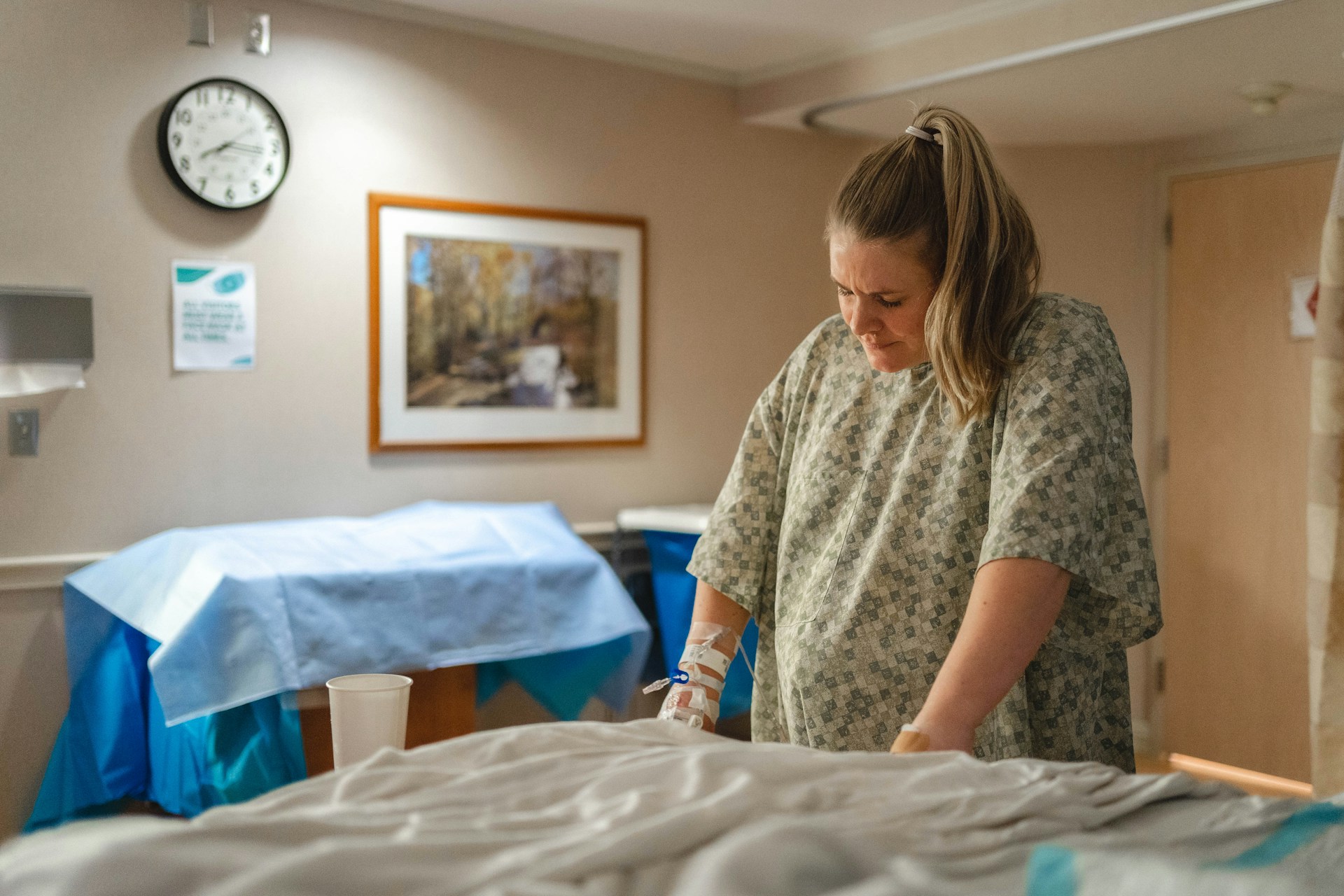
The UK’s shocking timetable of failure in maternal care
As maternal death rates in the UK remain at a 20-year high and inspectors say there is a risk of harm that childbirth becoming 'normalised', families and experts are calling for urgent action.
A report by the Care Quality Commission (CQC) on its inspections of 131 locations, found that 65 per cent were not safe for women to give birth - and not a single unit's care was graded as ‘outstanding’.
These figures are the latest in a long line of issues regarding maternity care in the UK over the last 20 years.
In its report, the CQC found:
- Harm during childbirth was at risk of becoming “normalised”
- A 'significant' number of patient safety incidents went unreported
- Inequalities in outcomes for mothers from ethnic minority backgrounds were still prevalent
- A 'significant' variation in care across different trusts
- Chronic issues around recruitment and retention of the maternity workforce
Worrying issues continue to be revealed every day with two maternity units in the UK being issued with formal warnings in just the past week.
The crisis is not cheap either. Maternity care payouts cost the NHS £1.1bn last year.
How did we get here?
Concerns about maternity services were first investigated in 2015, after inadequate care was linked to the deaths of three mothers and 16 babies in hospitals in the Morecambe Bay NHS Trust between 2004 and 2013.
The following report by Dr Bill Kirkup revealed “a series of failures at almost every level” which led to then Secretary of State for Health Jeremy Hunt calling for NHS England to produce new guidelines on reporting serious incidents and a review of professional codes of conduct for medical staff.
In 2022, another investigation by Dr Kirkup found similarly shocking failings at maternity units in East Kent had led to the avoidable deaths of up to 45 babies over an 11-year period.
In his executive summary Dr Kirkup said that we must “break the cycle of endlessly repeating supposedly one-off catastrophic failures”.
He added: “If we do not begin to tackle this differently, there will be more.”
In March 2022, the Ockenden inquiry exposed shocking failures in maternity care at Shrewsbury and Telford NHS Trust and found that at least nine women and 201 babies, if given a better standard of care, could have survived.
Examining over 1,500 cases spanning over 20 years, the investigation, led by senior midwife Donna Ockenden, found that fatalities were often not investigated and that some mothers were even blamed for their own babies' deaths.
Calls for compassionate care, as well as improvement in funding, training and accountability across all maternity services are just a few of the 60 improvements that Ms Ockenden believes could have been made to ensure safety for mothers and babies.
Ms Ockenden is now heading the UK's largest independent review into the quality and safety of maternity care, involving the cases of 1,700 families at Nottingham University Hospitals.
The report is expected in September 2025.
In January 2024, an All-Party Parliamentary Group on Birth Trauma heard “harrowing” testimony from over 1,300 women. Mothers described pain medication being refused, being left on blood-stained sheets and life-long physical and mental impacts of their experiences.
The resulting report detailed “a maternity system where poor care is all-too-frequently tolerated as normal.”
What is the government doing?
Following the Shrewsbury report in 2022, the government at the time said it would increase spending on maternity care by £95m a year, with the money being used to hire around 1000 midwives and 80 consultant obstetricians.
However, analysis of the new Labour government’s NHS funding revealed that just £2m of that £95m would be ring fenced for maternity care in 2025/26.
Gill Walton, Chief Executive of the Royal College of Midwives (RCM) said: “These budget cuts are more than shocking, they will rip the heart out of any moves to improve maternity safety.
“The Government has taken a wrecking ball to the work that’s being done up and down the country to improve maternity safety.”
The National Maternity Safety Ambition was launched in 2015 and aimed to halve the 2010 rates of stillbirths, neonatal and maternal deaths by 2025.
This target has not been met and maternal death rates in the UK remain higher than they were 20 years ago in 2021-2023, according to data from MBRRACE. Despite decreasing since last year, the number of maternal deaths still stands at 12.67 per 100,000 babies born.
In 2022, the Women’s Health Strategy for England set out plans to explore disparities in maternity care, and address poor outcomes among women from minority ethnic backgrounds and those living in deprived areas.
Yet in June 2023, the Women and Equalities Committee published its report, Black maternal health, expressing concern about Black women’s experience of maternity services and concern that “Government and NHS leadership have underestimated the extent to which racism plays a role”.
The most recent policy for maternity care is set out in the Three year delivery plan for maternity and neonatal services published by the previous government in 2023. However, since coming into power, no further policies to tackle this crisis have been announced by the Labour government.
Speaking after attending the Birth Trauma APPG last year, Ms Ockenden said: "Quite frankly, we can't keep having report after report with warm words saying things are going to get better, we have to do better."
At a time of such clear failings, Sheffield Wire’s campaign Maternal health: Unseen threat, unequal care is unearthing the foundations of the crisis within maternity care, and #DemandingBetterBirths.
If you have been affected by the content in this article, you can find support via the Tommy’s helpline at 0800 014 7800, or Petals.
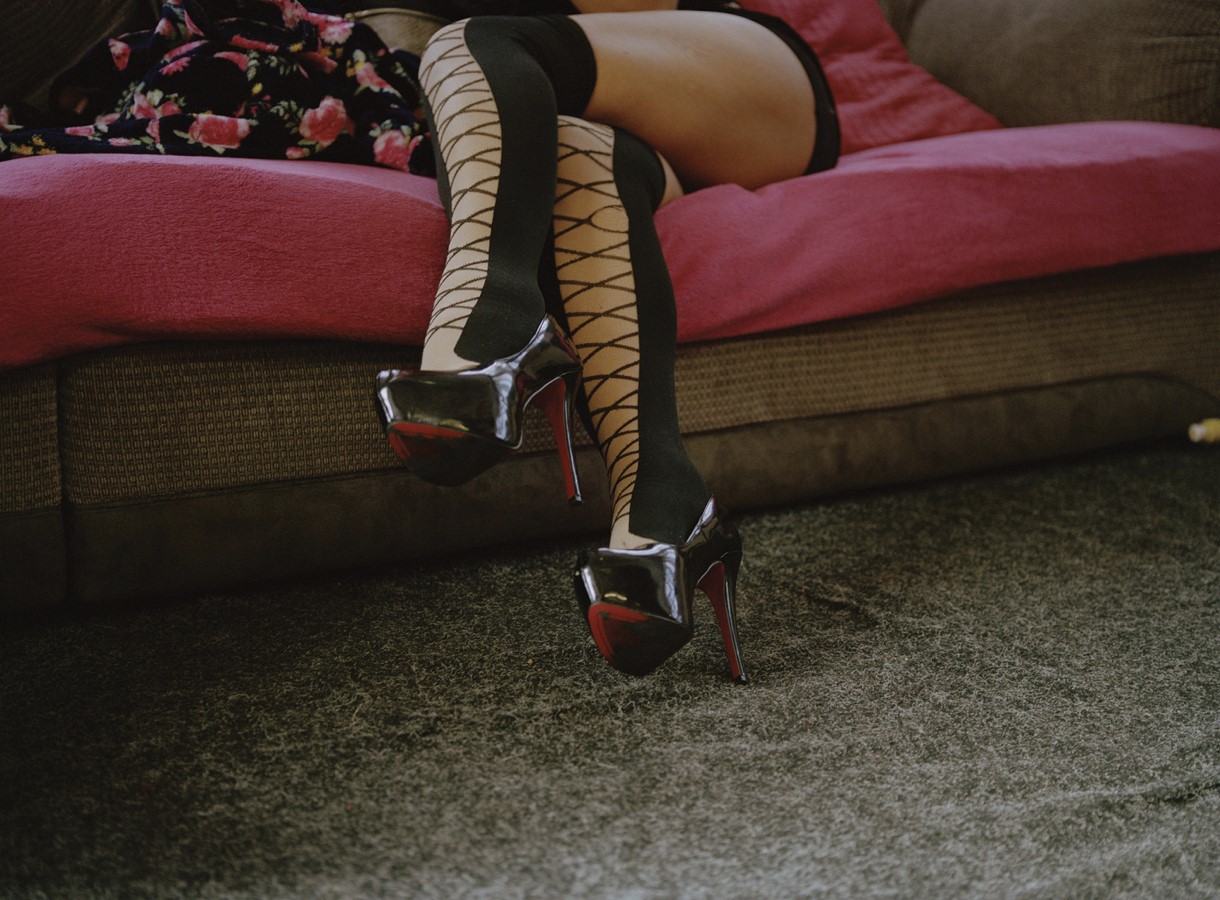
The spectrum of sex work: from stigma to glamour
Sex work is the oldest profession in the world - an estimated 80,000 people operating in the UK, not including those in digital and online activity. The genuine number however may never be known due to the stigma of the job that persists even in a sex-positive culture.
Recent years have seen a growing sense of empowerment for many in the industry while others have suffered from abuse and exploitation.
This is shown in the often polarising debate that talks in extremes, with the spectrum and complexities of the lived experience for many women ignored.
But this spotlight investigation aims to educate, open discussions and inform on the realities of sex work.
Throughout the course of this investigation, keep an eye out for:
- A photographer speaking about her “eye-opening” project on City Sauna, a mother and daughter run brothel in Sheffield.
- An expert in violence against women explaining why sex workers are 18 times more likely to be murdered than the rest of the female population.
- The English Collective of Prostitutes’ report on the prostitute’s caution, which highlights how current UK law traps sex workers into cycles of poverty and exclusion.
- A digital sex worker giving a candid look into the reality of online sex work, challenging misconceptions whilst shedding light on the rewards and dangers of the industry.
- A volunteer opening up about the reality of street sex work in Sheffield, and the medical negligence women often experience as a result of their profession.
- A 24-year-old high-class escort who makes £4,000 a month servicing older men to fund her dream of becoming an actress.
Let’s ask, how do we honour the women working in this age-old industry without romanticising exploitation?

Unspoken dangers: the alcohol crisis in the LGBTQ+ community
While headlines hail a national shift away from alcohol it appears one group is being left out of the picture. New figures show 70 per cent of the Queer community engage in binge drinking with LGBTQ+ adults more prone to high-risk alcohol
consumption than the general population.
The complex history of homophobia has meant visits to bars and clubs have been essential for Queer people who want to socialise safely. But in 2025, why is the community still being driven toward places where alcohol runs the show?
"It's a shame. These spaces can be a hotbed for addiction," Leeds Drag queen Mattress says.
Queer people often turn to drink as a coping mechanism for the stresses they face from society and pillars in the community say alcohol-free spaces are needed now more than ever.
Options for a welcoming space that doesn't centre around alcohol are emerging. One Londoner, sober for 13 years, has established Club Soda and Queers without Beers after losing her own father to alcoholism.
Another, Neil Hudson-Basing, wishes his peers knew how "fun and how crazy life can be" without alcohol. He set up a House of Happiness for those who want to party without the hangover the next day.
But those offering tailored support are still struggling to connect with the community. "Some of the people who access the service access it while closeted. They're scared of revealing their status," one outreach team leader says.
Brewing companies, meanwhile, stand accused of marketing their drinks towards the gay community for events such as Pride while ignoring the dangers.
Now experts are considering if the term alcoholism even encompasses the reality of a life ruled by drink.
Shannon Murray is just one of the researchers saying there's a significant gap in our understanding of substance use among the full spectrum of LGBTQ+ communities in the UK.
On the Sheffield Wire's Under the Influence: Queer Lives and Alcohol campaign, we hear from specialists, venue owners, recovered alcoholics and everyone in between to investigate and raise awareness of issues surrounding alcoholism in the LGBTQ+ community.
“You’re not a real person-you’re an object I bought”: The stark reality of violence against sex workers
Sex workers are 18 times more likely to be murdered than the rest of the female population, according to experts, revealing the terrifying reality of violence in the sex work industry.
Dr Fiona Vera-Grey, an expert in violence against women, based at London Metropolitan University, believes this is reflective of the fact “violence against women is so woven into the fabric of society".
“We don't find it surprising or outrageous anymore," she says. "Sex workers are more likely to be targeted for sexual violence because they're not valued as much by society so there's not going to be a huge public outcry.”
There is a well documented history of violence against sex workers, from Jack the Ripper - who murdered sex workers in Victorian London to Peter Sutcliffe, known as the Yorkshire Ripper who killed 13 women, including seven sex workers.
“Jack the Ripper was able to do what he did because he was killing sex workers, and nobody sees these people as people," says Vera-Grey.
She believes attitudes have hardly changed since the 19th-century murders, stating the men who solicit sex workers often think “you're not a real person, you're an object that I've just bought and you have to do what I tell you”.
Dr Vera-Grey pointed out the sex workers who are the most exploited are often an already marginalised group such as people of colour or those facing homelessness and substance abuse.
“We're in a patriarchal society, and a racist society," she says. "This means sex work is often the purchase by white men of black and brown women."
Research suggests that ethnic or racialized minorities make up a substantial proportion of the sex worker community, up to 22.8% in the UK and USA.
Women of colour are among the most marginalised in the industry, yet it is the stories of white, middle-class women that are more readily framed as empowering or glamorous.
Dr Vera-Grey, who teaches on the Women and Child Abuse MA course at London Met, says: “As a society, we are comfortable with the image of a white middle-class woman who's selling sex to put herself through university, but we don't think so much about the homeless woman who's clearly a drug user.
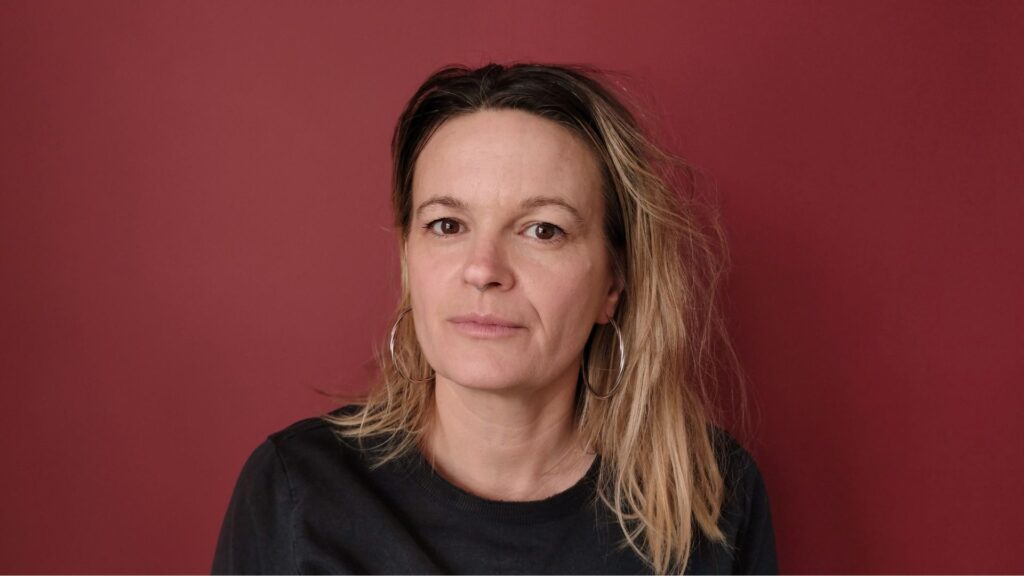
A study, published in BMJ Journals, on London sex workers showed those who work on the street experience over double the amount of violence from clients than off-street sex workers.
“Who are the men who are buying sex off this woman? They can see that she's in an exploited situation," says Dr Vera-Grey. "What are their motivations? Those men are the most dangerous.”
In the UK, “curb-crawling”, which is the act of driving along the streets in search of a sex worker or going to a brothel, is illegal but Dr Vera-Grey argues that the current legal framework fails to address the real issues at hand.
“The men that are buying street sex workers in this country are committing a criminal offense and they're some of the most dangerous men because they don't care about the fact that they're committing a criminal offense,” she says.
Dr Vera-Grey believes the proposed Nordic model, which criminalises the purchase of sex but not the selling of it, will harm sex workers’ safety. “It’s going to make the women less safe," she says. "It's going to push everything underground. What needs to happen alongside the Nordic model is the introduction of really well-resourced exit services to support women to be able to exit prostitution if that's what they want to do.”
Calls for decriminalisation of sex work also do not address the issue of violence, Dr Vera-Grey believes. “In areas where there is a fully legalized sex industry, there are still really high levels of sexual violence against sex workers.” She believes the effects of increasingly violent pornography fuels sexual violence, especially for sex workers.
The Childrens’ Comissioner Study in 2023 found 79% of young people had encountered violent pornography before the age of 18 and 47% think girls ‘expect’ sex to involve physical aggression such as airway restriction or slapping, and a further 42% believe most girls ‘enjoy’ acts of sexual aggression.
Dr Vera-Grey spoke to a sex worker, who was in her 50s, as part of her research. “The sex worker noticed younger clients wanted practices that were taken from pornography and wanted to treat her much less like a person," she says.
"She was quite taken by the fact that there was a difference in ages in terms of her clients and the younger ones wanted to do some more dehumanizing stuff. With one of them in particular, she had said 'that’s not how you treat your girlfriend. That's not how you treat women'.”
This widely accepted violence against sex workers is perpetuated by true crime, such as Netflix’s ‘The Ripper’, believes Dr Vera-Grey. “It becomes unextraordinary, and that has a huge impact on how much the public then puts pressure on the government to do something to stop.
“Some women are sexually murdered. It's just something that we kind of accept as a society.”

‘I can make more in three hours than I would make in a month at my day job’: inside the life of a high-class escort
Her face blurred in lingerie-clad photos, Annie's images are splashed across an exclusive website, advertising herself as a high-class escort. It might not be for everyone, but this well-educated museum worker is fiercely protective of her side-hustle which she feels is 'romantic and glamorous'.
"I am damn proud of what I do," says Annie, 24. "I'm really bloody good at it, and I enjoy it. Not many people can say that for their jobs."
Annie, not her real name, became a high-class escort at the beginning of 2025 to fund her dream of going to drama school and becoming an actress. "It feels like an acting gig," she says. "I am playing the role of my alter ego, who is quite different from me."
While agency-based escorting only represents around 4% of the UK sex industry, it’s often the kind of work which fuels the glamorous image of sex work seen in media- expensive dinners, luxury hotels, and generous paydays.
Clients select her profile and arrange meetings through her female agent, who also used to be a sex worker, and takes a deposit. According to UK law, this practice which is classed as 'pimping' is illegal. However, the agency gets around the law by claiming they sell the workers' time rather than explicitly advertising sex.
Although, Annie explained that sex is not optional on these dates. “They [the clients] have already paid the deposit. They give me the cash up front. I don't know if they would demand money back if I didn't have sex or if they would get angry.”
She works predominantly for financial necessity and in the last three months has saved over £5000 from the earnings she has made. “It is the first time in my life I've ever had savings," Annie says.
She grew up the youngest of six children to a single mother who had “no money”. It was only with the financial assistance of a full bursary and working part time in hospitality Annie was able to complete her English Literature degree at university.
For the three years she was “living paycheck to paycheck,” but now works in a museum while she is training to be an actress. But Annie explains this will not fund the £20,000 she needs to go to drama school.
"I can make more in three hours as an escort than I would make in a month at my day job," she says. "For most of the girls at the agency, it's their side hustle. They're all different ages and all of them have professional careers."
Annie currently works two to three times a month. The agency Annie is registered with offers a “girlfriend experience” to high-end clientele, typically to men in their 50s and 60s, many of whom are married with children.
For each job, Annie earns around £1,000 in cash for a three-to-four-hour date, which typically includes dinner, a theatre show, or a hotel visit. “They'll take you to a gorgeous restaurant," says Annie. "You'll have champagne, cocktails, and three courses. The bills will be hundreds of pounds. They'll be very gentlemanly. They'll treat you like you're a goddess and a princess and the most gorgeous thing in the room.
"Most of the time, they just want someone to chat to, and they want to be seen at a restaurant with a younger girl, they want someone who is going to laugh at all their jokes."
She describes all of her sex with clients so far as "vanilla", not lasting more than 15-30 minutes. “You can always just close your eyes and think of your work crush," she says.
The aspiring actress is a “homoerotic bisexual”, meaning she is more attracted to other women and says she would only date a woman, making it easier to separate her sexuality from her work. “I have not been attracted to a single one of these men,” she says. "I think it's a job most people wouldn't want to do, but I genuinely think it's a job most people wouldn't be able to do."
Annie is keenly aware of the stigma surrounding her profession but is adamant that people shouldn't be judged for their individual choices. "I'm not ashamed of what I do, but I don't want to publicise it," she says. "I know that there is a massive societal prejudice." Annie has only told a close circle of friends about her job and feels fortunate that her female friends are very supportive but two of her male friends were very judgmental and “preachy”.
"We've still not really gotten over this Victorianized mechanical view of women who need to be saved," Annie says.
To ensure her safety, the agency Annie works with verifies client identities, and she calls her agent when arriving and leaving the meeting location. In the UK, women involved in sex work are 18 times more likely to be murdered than the rest of the female population.
“It’s not that different from going to a hook up," Annie says. "You're still meeting someone that you don't know but it does feel safer than that, because I know that he has been vetted, that he's been checked, I know his identity. If anything happens to me, they will be in immediate trouble, and my agent will go straight to the police.”
Annie also uses platforms such as Ugly Mugs, a website that allows sex workers to report bad experiences and identify the men, so that other sex workers can cross-check their potential clients.

The only negative sexual encounters Annie has experienced have been with men her own age, whom she has slept with outside of work. "They are the ones who will start choking you or slapping you around, calling you really vile names," she says.
Annie believes this behaviour has become a norm in some younger men and stems from the access to graphic porn sites. "Mainstream porn on PornHub is quite violent and unpleasant. It feels misogynistic. It doesn't feel like romantic sex. It feels so brutal and animalistic."
Annie’s believes her style of sex work allows her to feel safe. She is adamant she wouldn't do street sex work, where workers solicit customers in a public place. “I think it's unsafe, and you're much more at risk from abducted, raped or murdered,” she says.
But Annie is keen to point out that she is in a different financial position to street sex workers. “A lot of the people who do that kind of sex work are a lot more desperate and fuelled by sort of more basic needs than to fund a degree," she says. “I'm not doing this because I need to do this to survive. I'm doing this because I want to pursue the things that I enjoy. I think that's a very big difference.”
Annie operates in a legal "grey area", technically selling her companionship rather than her body, and advocates for decriminalization of sex work and regulation of the industry. “We are not the criminals," she says. "We're just people. I think if you're doing it in a way that isn't hurting anyone, like ethical, fair trade sex work, then I genuinely do not see the problem with it.
"If something does go wrong and someone is hurt badly, decriminalization means they can go to the police and can be investigated, without them worrying about being treated as a criminal themselves."
Annie and her fellow agency workers do not support the Nordic model of sex work legislation, an approach which has been adopted in several European countries, including Sweden, France and Northern Ireland, where those who are purchasing sex are criminalised, and those people selling sex are decriminalised.
"It comes with the narrative that all sex work is inherently harmful and violent and insidious," Annie says. "There's still quite a stigmatized view of sex work but it needs to be treated like it is a valid choice and a valid job.”
